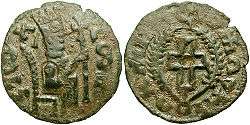Armah
| Armah Kingdom of Aksum | |||
|---|---|---|---|

|
Armah (reigned 614–631) was a king of the Kingdom of Aksum. He is primarily known through the coins that were minted during his reign.[1] However, it has been suggested as long ago as 1895 that he was identical to Ashama ibn-Abjar or Sahama, who gave shelter to the Muslim emigrants around 615-6 at Axum.
Munro-Hay states that either Armah or Gersem were the last Axumite kings to issue coins. Bronze coins from the reign of Armah show him depicted as a full-length figure enthroned, with Christian cross motifs throughout."[2]
Armah's silver coins have an unusual reverse, showing a structure with three crosses, the middle one gilded. Munro-Hay quotes W.R.O. Hahn as suggesting that this is an allusion to the Holy Sepulchre, as a reference to the Persian capture of Jerusalem in 614; if this is correct, it provides a date for Armah.[3]
Notes
- ↑ A letter to Antoine d'Abbadie, dated 8 January 1869, mentions a coin of this ruler. Sven Rubenson, Acta Aethiopica, vol 3: Internal Rivalries and Foreign Threats, 1869-1879 (Addis Ababa: University Press, 2000), p. 3
- ↑ www.coinweek.com/featured-news/the-coinage-of-aksum/
- ↑ This article is based on S. C. Munro-Hay's discussion in his Aksum: An African Civilization of Late Antiquity (Edinburgh: University Press, 1991), p. 91.